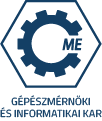The Main Objectives and Fields of Research of the Doctoral School
Mechanical engineering plays a fundamental role in improving the quality of human life, as goods are largely produced with the help of machines. The aim of the Doctoral School is to prepare students for scientific research, with a particular focus on the basic sciences of mechanical engineering, the design of machines and structures, and materials science and manufacturing processes. Modern computing tools enable the complex modeling of physical phenomena, which is essential for understanding the problems that arise during design, manufacturing, and operation. The Doctoral School focuses on nonlinear mechanical tasks, the development of numerical methods, and issues related to mechatronic systems and multidisciplinary optimization, thereby contributing to the scientific foundation of mechanical engineering innovations.
Main Research Fields
- The structure of models giving proper description of real relationships
Using computer-aided methods, the nonlinear effects of physical phenomena can also be considered. Nonlinear material properties changing with time, surface roughness (tribological problems), the wear of bodies sliding on each other, heat generation, electric and magnetic effects, different technological processes (welding, metal forming, machining), clarification of the behaviour of solid bodies (containers, pipelines) containing gas or fluid with a load changing over time - all of these mean a challenge which should be solved with experimental evidence, by setting up well-established phenomenological models and giving a reliable solution by use of the models. - Research of solution methods
Although the speed of computers increases day by day, achieving the proper accuracy, particularly in case of nonlinear problems, pushes to the front the foundation of new variation methods in the field of finite element method, the adaptive regulation and regeneration of the mesh, as well as the development of parallel techniques for multiprocessor calculations. - Tasks related to coupled physical phenomena
One of the major groups of tasks involving body contact includes surface microgeometry, friction anisotropy, and heat generation caused by friction, as well as monitoring wear when the nonlinearly connected differential equation system related to thermal and mechanical fields has to be solved quickly, but with reasonable accuracy.
The other group of tasks is related to adaptive structures and mechatronic building elements. Complex mechanical systems require a reaction to adverse environmental effects. The application of the finite element method provides a good opportunity to analyse adaptive structures.
The third group of tasks is in connection with the forecast of damage. Reliable (experimentally established) criteria are needed to forecast the development and spread of cracking and damage, while an accurate approximation of stress distribution is needed. Another group of tasks tries to clarify thermal processes of a strongly nonlinear character, occurring with transport processes, as well as the rheological relationships of fluids and gases and their mixtures with solid particles - Simulation, virtual production
Models of mechanics describing reality are used, on the one hand, to determine stresses and strains and dynamic properties, on the other hand. From the stresses - on the basis of material science results - it is possible to deduce the long-term strength and lifespan, and we can also get information about the operation of the equipment.
One of the ranges of simulation is related to making the material models more precise (e.g. in case of composites this relates to clarification of the relationship between the matrix and the strengthening fibres, and the definition of the residual stress arising in the course of production). The other range provides an opportunity to forecast the behaviour of the engineering equipment with different technological parameters (load, material properties, geometry, etc.).
In the case of forecasting, a crucial point is whether it is possible to examine the construction and the production technology before its introduction in a numerical way, without manufacturing the prototype. It is possible to accomplish virtual production, which is a fast and at the same time economical solution: this enables us to clarify the effect of certain parameters, and map optimum solutions with numerical experiments. The importance of this is increasingly significant in tough market competition. - Multidisciplinary optimization
The development of the optimal design of structures and machines creates problems that need input from several disciplines, previously working independently of each other, and requiring the balance of the priorities of each discipline. An example is designing structures and technologies taking environmental protection into consideration. - 6. Mechatronic systems
We are witnessing a new view of machine design, since a great number of machines and devices operate on electronic or other types of energy requiring control. Due to this the principles and methods of mechanics, informatics, electronics, control technology should be used jointly within a large system. In fact, the kinematic and dynamic properties of actual structures and devices can be identified by considering all interactions. More developed models of the operation of high-speed robots and mechanisms take into account even the deformation of elements.


